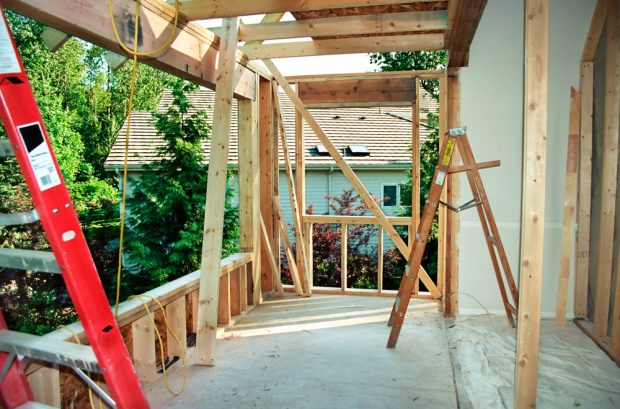 Home remodeling project. (Source: Shutterstock)
Home remodeling project. (Source: Shutterstock)
Mortgage applications dropped to their lowest point in 28 years in February, according to the Mortgage Bankers Association, which means more homeowners are staying put. This doesn't mean all homeowners think their house is perfect, but rather they want to keep their current mortgage rate.
The average 30-year rate jumped from 3.22% in January 2022 to a high of 7.08% at the end of October 2022 according to Freddie Mac, which is an increase of nearly 400 basis points (4%) in 10 months. Economists are split as to what will happen in our economy in the coming months, causing uncertainty, but we could see further mortgage rate hikes, depending on what happens.
Recommended For You
So instead of buying a new home, homeowners are turning to home improvement projects to make their current one closer to their dream home. Projects like adding a home office, a new patio or even splurging on luxury projects like a swimming pool are still increasing.
Another explanation for the rise in home improvements is a significant percentage of homes are aging and in need of costly maintenance updates such as a new roof. Almost half of the homes in the U.S. were built before 1980, and another 35% were built before 1970, according to the National Association of Home Builders (NAHB), so many homes are in need of regular repair.
This is an opportunity for credit unions feeling the pinch of decreased mortgage loans.
Credit unions are dealing with a lot right now, between a challenging market and liquidity concerns. But while mortgage applications are down, most credit unions are experiencing a dramatic uptick on HELOCs and a strong complement to HELOCs is unsecured home improvement loans.
Home improvement loans fit between HELOCs and personal unsecured loans and are more favorably priced than personal loans and credit cards. They also work for borrowers who haven't built up much equity in their homes yet. They also allow credit unions to expand outside their footprint and gain geographical diversification.
An Easy Lift for Credit Unions
Home improvement loans are available at point-of-sale through licensed and insured contractors, eliminating upfront work on the part of the financial institution, and are funded to the contractor for work completed upon the homeowner's approval. They also offer consumers a fast option without tapping into their home's equity.
With an average HIL size of $72,000, it offers a creative solution to increase credit unions' profitability, diversify their portfolios, and if originating, they can even gain a strong member acquisition channel.
More than six years ago, AgFed Credit Union ($357 million, Washington, D.C.) added home improvement loans to its existing offerings. "We were pleasantly surprised by the cross-sell numbers from adding home improvement loans," AgFed President/CEO Margie Click said. "I don't know why everyone wouldn't offer it."
Home Improvements Show No Sign of Slowing
Home improvement loan demand continues to rise, offering a reliable source to deploy capital. At LendKey, we've experienced 195% year-over-year growth in our Home Improvement Loan program.
In fact, as residential construction continues to decelerate and housing stock continues to age, the rate of remodeling is set to outpace new construction, according to the NAHB, and by 2025 the market size is anticipated to reach well over $700 billion, with an estimated half needing financing.
 Sources: Angi Economics & Research – The Economy of Everything Home Report, IBISWorld – Swimming Pool Construction in the US – Market Site 2003-2007
Sources: Angi Economics & Research – The Economy of Everything Home Report, IBISWorld – Swimming Pool Construction in the US – Market Site 2003-2007
Credit Unions See Strong Returns Without Adding Resources
Unsecured home improvement loans can complement credit unions' existing offerings with a strong borrower profile and without adding additional resources. In a market that continues to climb upward, it can be a great option to enjoy strong returns in a challenging market.
 Will Sneed
Will Sneed Will Sneed is SVP of Lender Partnerships for the Cincinnati, Ohio-based lending platform and network provider LendKey.
© Touchpoint Markets, All Rights Reserved. Request academic re-use from www.copyright.com. All other uses, submit a request to [email protected]. For more inforrmation visit Asset & Logo Licensing.






